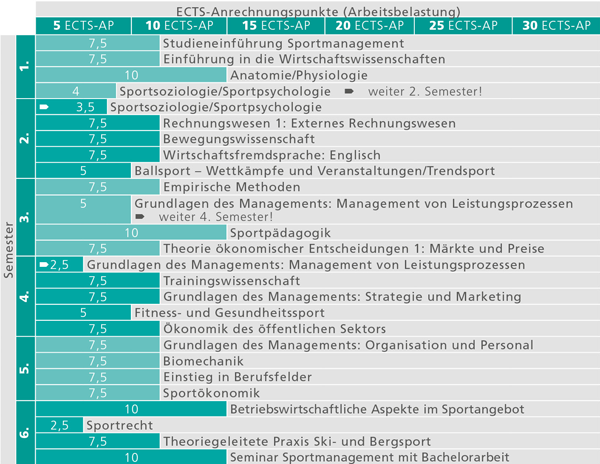Bachelorstudium Sportmanagement
Curriculum (2007W)
Ab dem Wintersemester 2015/2016 darf eine Zulassung zu diesem Studium nur nach dem neuen Curriculum erfolgen.
Bachelor of Science (BSc)
Dauer / ECTS-AP
6 Semester / 180 ECTS-AP
Studienart
Vollzeit
Sprache
Deutsch
Voraussetzung
Matura oder Äquivalent und Sprachnachweis
Fakultät
Fakultät für Psychologie und Sportwissenschaft
Niveau der Qualifikation
Bachelor (1. Studienzyklus)
ISCED-11: Stufe 6, EQR/NQR: Stufe 6
ISCED-F
1088 Interdisziplinäre Programme und Qualifikationen mit dem Schwerpunkt Dienstleistungen
Studienkennzahl
UC 033 626
Zusatzprüfung
Die Ergänzungsprüfung der körperlich-motorischen Eignung muss vor der Zulassung zum Studium nachgewiesen werden.
Informationen zur Prüfungsordnung inkl. Bewertung und Benotung
Prüfungsordnung
Die Prüfungsordnung ist integraler Bestandteil des Curriculums, detaillierte Informationen finden Sie unter dem Paragrafen Prüfungsordnung.
Bei der Notenverteilungsskala handelt es sich um die statistische Darstellung der Verteilung aller positiv absolvierten Prüfungen, die innerhalb eines Studiums bzw. eines Studienfaches (unter Heranziehung aller gemeldeten Studierenden eines Studiums bzw. eines Studienfaches) erfasst wurden. Die Notenverteilungsskala wird in regelmäßigen Abständen aktualisiert.
| A | B | C | D | E |
|---|---|---|---|---|
| Österreichische Notenskala | Definition | %-Satz | ||
| 1 | SEHR GUT: Hervorragende Leistung | 26,9 | = 100% | |
| 2 | GUT: Generell gut, einige Fehler | 33,7 | ||
| 3 | BEFRIEDIGEND: Ausgewogen, Zahl entscheidender Fehler | 25,5 | ||
| 4 | GENÜGEND: Leistung entspricht den Minimalkriterien | 13,9 | ||
| 5 | NICHT GENÜGEND: Erhebliche Verbesserungen erforderlich, Erfordernis weiterer Arbeit |
Gesamtbeurteilung der Qualifikation
Nicht zutreffend
Erklärung: Eine Gesamtbeurteilung (mit Auszeichnung bestanden, bestanden, nicht bestanden) wird nur über eine studienabschließende Prüfung, die aus mehr als einem Fach besteht, vergeben (im Curriculum dieses Studiums ist diese nicht vorgesehen).
Empfohlener Studienverlauf
Der unten angeführte, exemplarische Studienverlauf gilt als Empfehlung für Vollzeitstudierende, die das Studium im Wintersemester beginnen. Die Aufstellung dient der Darstellung eines möglichen Studienablaufs und ist nicht verpflichtend. Etwaige Prüfungswiederholungen bzw. deren studienzeitverzögernde Wirkung sind nicht berücksichtigt.
Die Regelstudienzeit beträgt 6 Semester bzw. 180 ECTS-AP, wobei gemäß Universitätsgesetz die Arbeitsbelastung eines Studienjahres 1.500 (Echt-)Stunden zu betragen hat und dieser Arbeitsbelastung 60 Anrechnungspunkte zugeteilt werden (ein ECTS-Anrechnungspunkt entspricht einer Arbeitsbelastung der Studierenden von 25 Stunden).
7,5 ECTS-AP: Studieneinführung Sportmanagement
7,5 ECTS-AP: Einführung in die Wirtschaftswissenschaften
10,0 ECTS-AP: Anatomie/Physiologie
4,0 ECTS-AP: Sportsoziologie/Sportpsychologie › weiter 2. Semester!
› 3,5 ECTS-AP: Sportsoziologie/Sportpsychologie
7,5 ECTS-AP: Rechnungswesen 1: Externes Rechnungswesen
7,5 ECTS-AP: Bewegungswissenschaft
7,5 ECTS-AP: Wirtschaftsfremdsprache: Englisch
5,0 ECTS-AP: Ballsport – Wettkämpfe und Veranstaltungen/Trendsport
7,5 ECTS-AP: Empirische Methoden
5,0 ECTS-AP: Grundlagen des Managements: Management von Leistungsprozessen › weiter 4. Semester!
10,0 ECTS-AP: Sportpädagogik
7,5 ECTS-AP: Theorie ökonomischer Entscheidungen 1: Märkte und Preise
› 2,5 ECTS-AP: Grundlagen des Managements: Management von Leistungsprozessen
7,5 ECTS-AP: Trainingswissenschaft
7,5 ECTS-AP: Grundlagen des Managements: Strategie und Marketing
5,0 ECTS-AP: Fitness- und Gesundheitssport
7,5 ECTS-AP: Ökonomik des öffentlichen Sektors
7,5 ECTS-AP: Grundlagen des Managements: Organisation und Personal
7,5 ECTS-AP: Biomechanik
7,5 ECTS-AP: Einstieg in Berufsfelder
7,5 ECTS-AP: Sportökonomik
10,0 ECTS-AP: Betriebswirtschaftliche Aspekte im Sportangebot
2,5 ECTS-AP: Sportrecht
7,5 ECTS-AP: Theoriegeleitete Praxis Ski- und Bergsport
10,0 ECTS-AP: Seminar Sportmanagement mit Bachelorarbeit

Qualifikationsprofil und Kompetenzen
Sport spielt als Wirtschaftsfaktor eine beachtliche Rolle (Sportartikelindustrie, Tourismus, Sportveranstaltungen). Die durch ein komplexes Vereins- und Verbandswesen sowie durch ein vielfältiges Angebot kommerzieller SportanbieterInnen gekennzeichnete Sportlandschaft verlangt überlegte organisatorische Strukturen, die ebenfalls nur durch Fachleute geschaffen werden können. Für AbsolventInnen des Bachelorstudiums Sportmanagement sollen folgende Qualifikationen und Kenntnisse für die berufspraktische Anwendung vermittelt werden:
- sportwissenschaftliche Kernfächer: Bewegungswissenschaft und Biomechanik, Trainingswissenschaft, Sportpädagogik, Sportpsychologie, Sportsoziologie, sportmedizinische und -historische Grundlagen;
- betriebs- und volkswirtschaftliche Grundkenntnisse: Rechnungswesen und Buchhaltung, Management, Marketing, ökonomische Entscheidungen;
- Grundkenntnisse und Projekterfahrung in Sportmanagement, Sportmarketing und Sportökonomik;
- sportbezogene rechtliche Grundlagen;
- sportpraktische Erfahrung und Leistungsfähigkeit in Grund-, Freizeit- und ausgewählten Trendsportarten;
- Kenntnis und Anwendung didaktischer und organisatorischer Grundlagen;
- kommunikative Kompetenz und Präsentationstechniken.
Erwartete Lernergebnisse
Die AbsolventInnen sind befähigt, wissenschaftliche Weiterentwicklungen im Bereich des Sportmanagement zu erarbeiten, zu beurteilen, anzuwenden sowie die erworbenen Kompetenzen fächerübergreifend einzusetzen. Sie verfügen über wissenschaftlich fundierte theorie- und methodengestützte Problemlösungskompetenzen.
Zukunftsperspektiven: Berufsfelder und Karrieremöglichkeiten
Spezifische Berufsfelder für AbsolventInnen des Bachelorstudiums Sportmanagement sind Sportartikelindustrie, Sporthandel, der Bereich des Sportangebots in Tourismus und Freizeit, das Management von Sportveranstaltungen, Sportverwaltung im öffentlichen Bereich, die Leitung von Sportzentren, die Vermarktung von Sportveranstaltungen und SportlerInnen, der Bereich des kommerziellen Sportangebots, betriebssportliches Angebot, die Führung von Sportverbänden und -vereinen, die Leitung von Gesundheitsund Kurzentren sowie Fitnessstudios.
Weiterführendes Studium an der Universität Innsbruck
- Masterstudium Sport- und Bewegungswissenschaft (2007W)
Anerkennungen
Kontakt und Information
Prüfungsreferat
Standort Innrain 52d

Informationen für Studierende mit Behinderung
